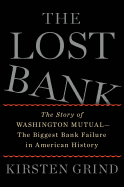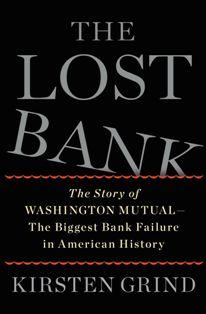
 The biggest single bank casualty of the 2008 financial meltdown was Washington Mutual, and Kirsten Grind chronicled its fall for the Puget Sound Business Journal, coverage that earned her a place on the Pulitzer shortlist. Now, in The Lost Bank, she traces the bank's long history--this was the local savings and loan that provided the mortgages to rebuild Seattle after the great fire of 1889--leading up to its tumultuous crash. Grind brings broad access not only to key people at WaMu and its federal and state overseers, but also to thousands of e-mails, letters, conversations, internal memos and regulatory filings. The result is an apocalyptic story in which the hard work and strong principles of Main Street are overcome by personal ambition, sloppy business practices, federal policy and the appetites of Wall Street investors.
The biggest single bank casualty of the 2008 financial meltdown was Washington Mutual, and Kirsten Grind chronicled its fall for the Puget Sound Business Journal, coverage that earned her a place on the Pulitzer shortlist. Now, in The Lost Bank, she traces the bank's long history--this was the local savings and loan that provided the mortgages to rebuild Seattle after the great fire of 1889--leading up to its tumultuous crash. Grind brings broad access not only to key people at WaMu and its federal and state overseers, but also to thousands of e-mails, letters, conversations, internal memos and regulatory filings. The result is an apocalyptic story in which the hard work and strong principles of Main Street are overcome by personal ambition, sloppy business practices, federal policy and the appetites of Wall Street investors.
Washington Mutual was a no-frills, "Friend of the Family" institution that shepherded its customers' savings, helped them buy their homes on fixed-rate long term mortgages--and knew them by name. When Kerry Killinger took over as CEO in 1990, WaMu was a very profitable stock corporation. In response to new bundled mortgage investments (collateralized debt obligations, or CDOs) insured by Fannie Mae, Ginnie Mae and Freddie Mac, Killington vastly increased the bank's participation in writing sub-prime mortgages to questionable borrowers, then reselling those mortgages to Wall Street investors. The bank's stock price rapidly rose, and Killington was named Banker of the Year in 2001.
But those who go up too fast often come down even faster. By 2008, nobody on Wall Street would touch WaMu when it desperately needed a buyer or capital investment. Bad loans, bad news and bad PR turned customer worry into a major run on deposits. The FDIC stepped in and closed the bank, selling selected branches and assets to JP Morgan on the cheap. Once known for its loyal employees ("like being part of a very large, quirky family") and leadership ("close-knit, hardworking... they were competent and straightforward and just... nice"), WaMu was no more.
Grind's story of the rise and fall of Washington Mutual has moments of humor and a broad cast of characters--and though we already know how it is going to end, the tragedy is moving. While the trend is to blame our financial meltdown on Wall Street, Grind shows us how a plethora of dysfunctional government agencies, coupled with a policy encouraging homeownership for all and investors chasing high yields no matter the risk, contributed just as much to the wreckage on Main Street. --Bruce Jacobs, founding partner, Watermark Books & Cafe, Wichita, Kan.
Shelf Talker: Pulitzer finalist Kirsten Grind tells a dramatic story of the rise and fall of one of our largest "main street" banks in the financial meltdown of 2008.

